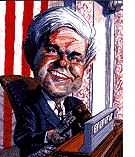
November 19, 1996: The Dirty Dozen have been re-elected to Congress, most by a comfortable margin.
A notable exception: Far-right freshman Steve Stockman (R-Texas), garnered only 46.4 percent of the votes in his district, and faces a December 10 run-off against his opponent, Nick Lampson.
Among the two “good women” singled out for praise due to their strong ethics, Lynn Rivers (D-Mich.) has been re-elected, while Linda Smith (R-Wash.), an advocate of campaign finance reform, is still waiting for the results of a ballot re-count.
In the 1967 movie The Dirty Dozen, Lee Marvin forged a band of corrupt misfits into a patriotic fighting unit. The 104th Congress, led by Newt Gingrich, went the other way.
Elected as a patriotic force promising to clean up government corruption, Newt’s recruits perfected the art of legislating favors for financial sponsors. Though often robed in Christian righteousness, these sponsors read like a list of vice peddlers. Gambling casinos. Tobacco giants. Gun lobbies. Big polluters. Arms manufacturers.
In selecting our Dirty Dozen, we looked at House members with financial ties to these and other influential special interests. We paid particular attention to lawmakers who had received hidden money from (or performed covert favors for) these interests; to leading members of the powerful freshman class (which came in promising reform); and to the House leadership, with its vested interest in the status quo. Although there are other candidates who arguably meet these guidelines, we chose those representatives whom we believe best reflect the specific character of corruption in the 104th Congress.
Historically, congressional corruption has sustained itself through artful combinations of public interest and private pork. But there’s a new, permissive culture in the House. This Congress dispensed with the public interest part and took the payoffs — while claiming that God and the Market required nothing less.
Newt led the way, bringing the same creative flair to election financing that Michael Milken once showed on Wall Street. House Majority Whip Tom DeLay (R-Texas) upped the ante by openly inviting his corporate sponsors to redraft the nation’s clean air and water laws. And, in a truly bipartisan effort, many Democrats buttoned their lips about the corruption or joined in themselves.
Nor did the media speak up. Particularly in the high-stakes game of the season — telecommunications –media companies did more contributing than reporting, pumping more than $4.5 million into congressional coffers.
None of this has proved to be popular with the still-smoldering electorate. So in this election season, their campaign chests bulging, our Dirty Dozen and their congressional colleagues have dusted off their populist poses. They’re filling the airwaves, trying to sound like Lee Marvin’s World War II hero, with sanctimonious talk of their political courage and superior personal values. Given the amount of money they’ve collected, it might even buy them another round in the House.















